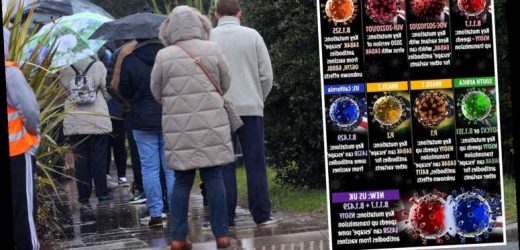RESIDENTS living in five postcodes have been urged to get tested for Covid today after six people were found to have been infected with the mutant Brazilian strain in England and Scotland.
The new variant is feared to be more contagious and may not respond as well to existing vaccines already being given out.
? Read our coronavirus live blog for the latest news & updates…
Surge test sites will open in South Gloucestershire where people will be able to drop off their tests.
It's the first time the variant has been discovered in the UK and South Gloucestershire Council's public health director Sara Blackmore reassured people that the risk of the variant was "low and contained".
Three cases of the variant of concern first identified in Manaus, Brazil – known as the P.1 strain – have been identified by Public Health England (PHE).
Two are from one household in South Gloucestershire with a history of travel to Brazil. A third is understood to be an unlinked case in England.
The other three cases were identified in north-east Scotland.
Residents who live in five postcode areas in South Gloucestershire, who are aged over 16 and do not have symptoms of Covid-19, are invited to come forward for testing from today.
The 5 postcode areas where testing is being rolled out
The government has said it will focus on five postcode areas in South Gloucestershire.
Surge testing will make sure the variant hasn't spread further than the cases that have already been identified.
The postcode areas are:
- BS32 0
- BS32 8
- BS32 9
- BS34 5
- BS34 6
People who travel into the areas – BS32 0, BS32 8, BS32 9, BS34 5 and BS34 6 – for work or to visit someone they are in a support bubble with are also able to have a test.
The identified postcode areas fall within Bradley Stoke, Patchway and Little Stoke and are different to those who were part of the previous community surge testing programme in February.
That testing followed identification of the Bristol variant and authorities say there is no connection between the two programmes.
Drive-in surge testing sites are now open at Stoke Gifford Parkway Park & Ride, as well as The Mall Coach Park at The Mall Cribbs Causeway.
A range of community-based locations, where residents can walk-in to collect a test kit, take it home and complete it there then return it for processing, will also be available.
The programme is expected to run for one week, ending on March 7, with the facilities open each day.
Ms Blackmore urged people who were invited to come forward and take a test.
“We are keen that all South Gloucestershire residents in the postcode areas identified take part in this testing, which will help us to identify positive cases and prompt self-isolation, which helps to break the chain of transmission,” she said.
“We do recognise the challenge for residents of undertaking another additional testing programme and want to thank you in advance for your patience and support as we continue to work together to protect our communities from Covid-19.
“We are working together with local and regional health partners, Public Health England and NHS Test and Trace, to deliver this swift, safe and co-ordinated response, with an enhanced community testing offer available to people in and around areas where this variant has been discovered.”
The surge testing is in addition to testing for people who have symptoms, and regular rapid asymptomatic testing for essential workers.
Ms Blackmore said it would “enable closer monitoring” and work to reduce further transmission of Covid-19.
What is the P1 Brazilian variant?
THE BRAZILIAN variant (P.1) carries three key mutations that affect the spike protein.
The spike protein is the part of the virus, SARS-Cov-2, that attaches to human cells and allows the virus to infect the body.
As a result, it is the part of the virus that the Covid vaccines are designed to target.
That's why scientists believe while the jabs should still work, they could be less effective against the Brazilian and South African strains.
Experts first detected the P.1 variant in Manaus, north Brazil, in December.
It is not yet known if the mutation causes more severe Covid-19, but evidence suggests it may be more transmissible.
Porton Down scientists are conducting more analysis to confirm evidence that indicates the strain does not cause any higher mortality rate or that it affects the vaccines or treatments.
It was detected in Brazil and in travellers from Brazil to Japan, and contains a unique constellation of lineage defining mutations.
Like the South African variant, the Brazilian one carries a mutation in the spike protein called E484K, which is not present in the original UK strain, or the widely circulating Kent strain.
The E484K mutation is present in the South African and Bristol strains.
The E484K mutation is thought to help the virus bypass the immune protection provided by prior infection or vaccination through antibodies.
Scientists analysing the Brazilian variant say the mutations it shares with the South African variant seem to be associated with a rapid increase in cases in locations where previous attack rates are thought to be very high.
They say it is therefore essential to rapidly investigate whether there is an increased rate of re-infection in previously exposed individuals.
“Even though we have a national road map to recovery from Covid-19, it is vital that we continue to follow the advice, which remains the same to everyone,” she added.
“Behave as if you are carrying the virus, stay in and only leave home if you must.
“Do not mix socially outside of your household and continue to observe public health guidance – hands, face, space. If you are invited to receive a vaccine, please do so.”
People will be able to collect tests from Little Stoke Community Centre and Patchway Community Centre today.
Two additional sites will open at Bradley Stoke Jubilee Centre and Baileys Court Activity Centre from Tuesday.
South Gloucestershire Council confirmed that any positive tests would be followed up with genome sequencing to identify the precise strain of Covid-19 in each case.
The testing will use PCR tests, which are analysed in laboratories, rather than lateral flow tests.
Mike Wade, deputy regional director for PHE South West, said: “All viruses mutate over time and since the start of the pandemic over 4,000 mutations have been identified in the UK.
“Most are not a concern for scientists, but we know that some mutations result in virus variants that we are keen to track more carefully.
“In the South West we’re working with NHS Test and Trace and local authority public health teams on tailored intervention measures for variants.
“These include more testing, additional genomic sequencing and enhanced contact tracing, enabling us to quickly identify any further cases and help prevent any onward spread.”
It comes after Britain yesterday reached the epic milestone of vaccinating a staggering 20 million people.
Health Secretary Matt Hancock hailed the "magnificent achievement" – a huge boost in the fight against the bug as lockdown begins lifting from March 8.
Source: Read Full Article







